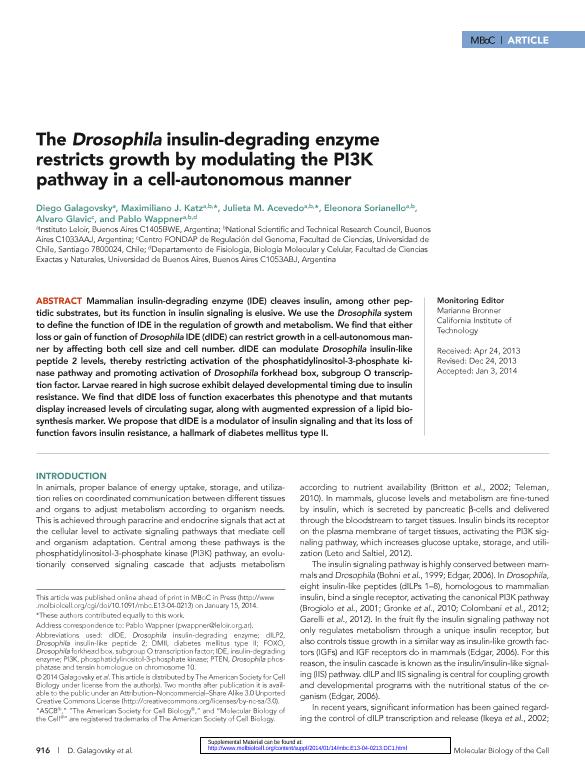Artículo
The Drosophila insulin-degrading enzyme restricts growth by modulating the PI3K pathway in a cell-autonomous manner
Galagovsky, Diego ; Katz, Maximiliano Javier
; Katz, Maximiliano Javier ; Acevedo, Julieta Maria
; Acevedo, Julieta Maria ; Sorianello, Eleonora Mariana
; Sorianello, Eleonora Mariana ; Glavic, Alvaro; Wappner, Pablo
; Glavic, Alvaro; Wappner, Pablo
 ; Katz, Maximiliano Javier
; Katz, Maximiliano Javier ; Acevedo, Julieta Maria
; Acevedo, Julieta Maria ; Sorianello, Eleonora Mariana
; Sorianello, Eleonora Mariana ; Glavic, Alvaro; Wappner, Pablo
; Glavic, Alvaro; Wappner, Pablo
Fecha de publicación:
03/2014
Editorial:
American Society for Cell Biology
Revista:
Molecular Biology Of The Cell
ISSN:
1059-1524
Idioma:
Inglés
Tipo de recurso:
Artículo publicado
Clasificación temática:
Resumen
Mammalian insulin-degrading enzyme (IDE) cleaves insulin, among other peptidic substrates, but its function in insulin signaling is elusive. We use the Drosophila system to define the function of IDE in the regulation of growth and metabolism. We find that either loss or gain of function of Drosophila IDE (dIDE) can restrict growth in a cell-autonomous manner by affecting both cell size and cell number. dIDE can modulate Drosophila insulin-like peptide 2 levels, thereby restricting activation of the phosphatidylinositol-3-phosphate kinase pathway and promoting activation of Drosophila forkhead box, subgroup O transcription factor. Larvae reared in high sucrose exhibit delayed developmental timing due to insulin resistance. We find that dIDE loss of function exacerbates this phenotype and that mutants display increased levels of circulating sugar, along with augmented expression of a lipid biosynthesis marker. We propose that dIDE is a modulator of insulin signaling and that its loss of function favors insulin resistance, a hallmark of diabetes mellitus type II.
Palabras clave:
Insulin Degrading Enzyme
,
Drosophila
,
Cell Growth
,
Insulin Resistance
Archivos asociados
Licencia
Identificadores
Colecciones
Articulos(IIBBA)
Articulos de INST.DE INVEST.BIOQUIMICAS DE BS.AS(I)
Articulos de INST.DE INVEST.BIOQUIMICAS DE BS.AS(I)
Citación
Galagovsky, Diego; Katz, Maximiliano Javier; Acevedo, Julieta Maria; Sorianello, Eleonora Mariana; Glavic, Alvaro; et al.; The Drosophila insulin-degrading enzyme restricts growth by modulating the PI3K pathway in a cell-autonomous manner; American Society for Cell Biology; Molecular Biology Of The Cell; 25; 6; 3-2014; 916-924
Compartir
Altmétricas



